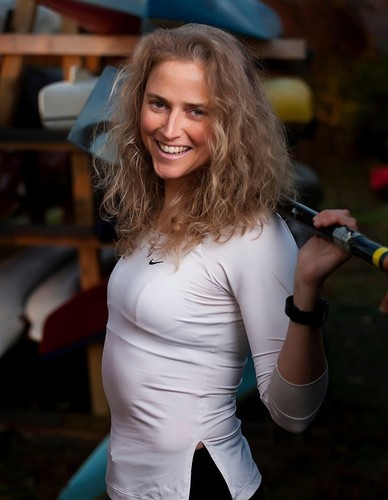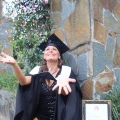Leigh-Chantelle

Strengths, Weaknesses & Outside Influences
What do you think is the biggest misconception about vegans and how do you address this?
Are the non-vegans in your industry supportive or not?
Are your family and friends supportive of your vegan lifestyle?
What is the most common question/comment that people ask/say when they find out that you are a vegan and how do you respond?
VLV Articles
Pam Boteler is a pioneering canoeist, former U.S. National Team paddler and President of WomenCAN International, a global voice for equality in Olympic canoeing. She helps open doors for women and girls around the world to compete equally in Olympic Canoeing and was the first woman in the U.S. to race in Sprint Canoeing at the U.S. National Championships in 2000 - women were prohibited from racing at the Nationals prior to this.
Racing against men, Pam has won Gold and Bronze medals. In 2001, she won a Gold medal in the Men's 4 person canoe event and was ranked 8th in men's canoeing by season's end. Through her efforts on and off the water, in 2002, USA Canoe/Kayak changed their bylaws to give women events of their own, and equal to the men. She was undefeated in the U.S. from 2000-2008 and still holds several American records at various distances. Pam retired from Sprint Canoeing in 2010 at age 42, adding more national records to her resume and finishing her career with 32 national championship medals and 11 international medals. She continues to race in Hawaiian Outrigger canoes and other paddling disciplines.

Why Vegan?
How and why did you decide to become a vegan?
They say change doesn’t happen until it is more painful not to change. I got to a place in my life in early 2007 where too many things seemed to be going wrong and right all at the same time. I was mostly vegetarian by this time, still consuming some dairy-based products and the occasional fish, with little processed foods. I felt like I was moving at 100 mph in some areas of my life and 1 mph in others. Essentially, I learned the hard way that even a decently clean diet could not prevent a physical/mental/emotional/spiritual breakdown nor prevent alarming health issues that needed immediate attention and reversal.
A lot of what was missing is that I had not fully comprehended the power of holistic nutrition and holistic (mind/body/spirit) living and being, nor had I fully comprehended the other reasons “why” choosing plant-based nutrition was so powerful. I continued to study health/nutrition and was fortunate to become friends with the “NotMilk Man” Robert Cohen. His information and support were the tipping points for me regarding going fully vegan in 2007 and having more awareness about compassion toward animals. The switch regarding food for healing and high performance didn’t flip until August 2007 when Cohen wrote an article about me. From that I was introduced to Dr. Doug Graham and began working with him on a low fat raw vegan diet. He also helped me work on my mental/emotional game. From there, I began rebuilding in earnest and things were changing for the better on the water and in the gym. I felt like I found a magic formula for healing and high performance to help me raise my game as an “aging” athlete.
As I studied more about compassion for self and compassion for animals and the environment, I was at a point where even the thought of an animal product crossing my lips was repulsive – even saddening. The images, sounds and stories of violence, pain, stress and suffering would flash through my mind. As I was working to move away from negative things in my life (the way I was treating myself and allowing others to treat me) and striving to be more compassionate to myself and others, I could no longer justify contributing to this. I could find no peace there.
"Brutality to animals is cruelty to mankind - it is only the difference in the victim."
- Alphonse de Lamartine, 1847
- Alphonse de Lamartine, 1847
How long have you been vegan?
7 years.
What has benefited you the most from being a vegan?
Eating a wholefoods, high fruit, plant-based diet, I have raised my game physically, mentally, emotionally and spiritually and it has paid off in sports and in life. By being more compassionate toward myself, I’ve fostered an environment within which I could heal, and thrive. I am able to be more compassionate toward others, and conscious of how my choices affect animals and the environment. I am focused outward rather than inward, and, feeling more at peace with life, I’m becoming a better person.
What does veganism mean to you?
Compassion for self, animals and the environment. Peace.
Training
What sort of training do you do?
I am a paddler and train and race in canoes and kayaks. I also run and do strength training. During winter months I will do more indoor training and add the rowing ergometer and/or spin bike for cardio.
How often do you (need to) train?
6 days per week, 8-12 hours per week.
Do you offer your fitness or training services to others?
If others are interested, I’ll give my two cents, but I am not a paid fitness or personal trainer. If/when I do engage, I offer my two cents with a holistic (physical/mental/emotional/spiritual) focus in mind.
What sports do you play?
I race and train in canoes and kayaks: Hawaiian outrigger canoes, marathon canoes, Olympic-style canoes and kayaks, and surf skis. Individual and team boats.
Strengths, Weaknesses & Outside Influences
What do you think is the biggest misconception about vegans and how do you address this?
That we are all judgmental, militant, skinny and unhealthy animal rights activist nut bags, who eat un-tasty food which lacks protein. We can address this by Stopping using labels like “vegan,” “vegetarian,” “Paleo,” “raw,” etc. My name is Pam and I eat what I want and what makes me happy and strong. You eat what you want and what makes you happy and strong.
I struggle with those who commit crimes in the name of animal rights, though, I also admit I applaud their bravery for seeking to end horrific practices against animals and efforts to save animals. These tasks seem overwhelming and insurmountable but we can all make a difference by not feeding the industries responsible for this violence and abuse.
All diet “communities” have a sense of arrogance and judgment - a sense of being in a “higher order.” Religious fanatics do this. It is unnecessary. Thrive in your own way and people will be drawn to your positive energy. Do less of shoving one’s lifestyle in the face of others. It feels religious at times and it does not need to be. Extend grace and compassion to yourself and to others.
Education must continue. I have benefitted from it and hope to continue to benefit. Plant food is quite tasty, particularly in its natural state e.g. raw fruits and greens. I have yet to suffer from a protein deficiency and I continue to raise my athletic game at age 46. I try to just do more and talk less. If people are interested in my story or ideas, I’ll certainly share and I hope they’ll share too.
What are your strengths as a vegan athlete?
My mental and emotional strength and poise have by far been the greatest improvement. My mental clarity is far greater. By removing mental/emotional barriers in all areas of my life and becoming even more convicted about my “Why” (why do I exist?), I am unlocking physical strength/endurance that I knew I had, but I was thwarting it with my negative choices and thinking. I have also experienced things physically I never thought I would. The window of possibilities is now limitless.
What is your biggest challenge?
Not eating enough fruit to get that clean, easy to digest base of calories.
Are the non-vegans in your industry supportive or not?
For the most part, yes. And I am playfully the butt of jokes, but come race day, they know I am going to deliver the mail to help our team do well. Almost all gladly take fruit that I share.
Are your family and friends supportive of your vegan lifestyle?
Yes and my Washington Canoe Club Wahine teammates strive to accommodate everyone.
What is the most common question/comment that people ask/say when they find out that you are a vegan and how do you respond?
“Where do you get your protein?”
Same place gorillas and elephants get their protein.
Who or what motivates you?
People doing grander things than I am. People who are stronger than me. People thriving on a primarily or all raw diet. People thriving on a whole-food/real-food plant based diet. Writing and doing sports herstory. Being a voice for others for positive change. Helping others who can’t help themselves. Waking up every morning and seeing a map of the world, knowing that is my playground. Making myself better, stronger, smarter and more at peace with the world every day – more than I was yesterday.
Food & Supplements
What do you eat for:
Breakfast - I eat when I’m hungry, but start the day with fruit – usually more juicy fruit (fresh squeezed OJ, grapes, some sort of citrus based smoothie.) If I feel like it, banana smoothies with young coconut water. More dense smoothies are bananas and dates blended with young coconut water and if I’m feeling really wild, some raw cacao powder and almond milk.
Lunch - I try to eat as much fruit until mid-afternoon as a goal. Sometimes if I need a break, I’ll have big salads or hummus with veggies.
Dinner - Dinners vary. Usually more cooked: sweet potatoes, quinoa, lentils, rice, vegetables and salads. Sometimes I’ve made “banana ice cream with chocolate date sauce”: frozen bananas blended in a food processor, a dash of organic vanilla flavoring. Date sauce = wet dates, raw cacao powder, cinnamon, blended.
Snacks (healthy & not-so healthy) - I have a weakness for chips and salsa.
What do you eat for:
Breakfast - I eat when I’m hungry, but start the day with fruit – usually more juicy fruit (fresh squeezed OJ, grapes, some sort of citrus based smoothie.) If I feel like it, banana smoothies with young coconut water. More dense smoothies are bananas and dates blended with young coconut water and if I’m feeling really wild, some raw cacao powder and almond milk.
Lunch - I try to eat as much fruit until mid-afternoon as a goal. Sometimes if I need a break, I’ll have big salads or hummus with veggies.
Dinner - Dinners vary. Usually more cooked: sweet potatoes, quinoa, lentils, rice, vegetables and salads. Sometimes I’ve made “banana ice cream with chocolate date sauce”: frozen bananas blended in a food processor, a dash of organic vanilla flavoring. Date sauce = wet dates, raw cacao powder, cinnamon, blended.
Snacks (healthy & not-so healthy) - I have a weakness for chips and salsa.
What is your favourite source of:
Protein, Calcium and Iron?
Protein, Calcium and Iron?
My goal is the highest quality calories – highest nutrient/calorie ratio and I seem to be getting what I need with this. I don’t eat food for isolated nutrients because nothing works in isolation. And I don’t eat food for a particular macro nutrient. If I have to think about protein, adding greens or celery to smoothies is a good way to get more raw protein and calcium and electrolytes.
What foods give you the most energy?
Food does not give me energy. I feel that food gives me the fuel I need to do what I want to do. I try to eat foods that do not require a lot of energy to digest, absorb and assimilate and eliminate. I have more energy because I don’t feel weighted down. My top choices for this are raw fruits, mostly low fat but I don’t avoid fats.
Do you take any supplements?
Occasionally. One record-breaking race I user Hammer Perpetuem (vegan) sports drink for supplemental calories. The race was a 3-day, 90-mile canoe race with running portages (running with a 90 lb boat). I was racing with 3 pro male canoeists. This race was 70 miles longer than I had ever paddled and my longest race prior to that was 3.5 hours. This race was 5, 4 and 3 hours/day, respectively, and I wanted to ensure I got my calories in and did NOT want to bonk and let down my teammates. I ate bananas, dates, and grapes during the race and cut up pieces of Eli Earth Bars (vegan bars). And drank the Perpetuem mixed in 2 liter water bottles. I had my necessary food with me, but felt I needed some extra caloric security as sometimes I couldn’t reach for the food. It worked and I felt strong every day – even feeling strongest on day 3. Our team finished 3rd in our division and 4th out of 70 4-person canoes. This was a highlight of my career. I also occasionally use “Scratch” powder in water and Vega Vanilla protein powder in smoothies.
Advice
Advice
What is your top tip for:
Gaining muscle - Eat more real food, lift big and sleep more! Ask yourself: What is my goal? Gaining muscle or getting stronger? And why do I want this? Stronger = stronger. Bigger muscles does not necessarily mean stronger. And in my sport, bigger muscles doesn’t mean faster in the boat. I’ve beaten people with bigger/leaner muscles and have lost to people with less muscle and more fat. Strength, efficiency, mental toughness, resiliency in rough conditions, and technical skills – these are things I must prepare for. Big/cut muscles are nice and I’m as vain as the next person, but I like winning more than I like big muscles.
Gaining muscle - Eat more real food, lift big and sleep more! Ask yourself: What is my goal? Gaining muscle or getting stronger? And why do I want this? Stronger = stronger. Bigger muscles does not necessarily mean stronger. And in my sport, bigger muscles doesn’t mean faster in the boat. I’ve beaten people with bigger/leaner muscles and have lost to people with less muscle and more fat. Strength, efficiency, mental toughness, resiliency in rough conditions, and technical skills – these are things I must prepare for. Big/cut muscles are nice and I’m as vain as the next person, but I like winning more than I like big muscles.
Losing weight - Ask yourself: What is my goal? What do I want to accomplish? Why do I want this? Until you have your “Why?” – you will never achieve your “What?” You must take a holistic approach to anything. Many factors affect one’s ability to gain/lose weight and it’s not just diet. A good first step is to increase whole fresh fruits, greens and vegetables and eliminate processed foods. Drink adequate water and get adequate sleep. Lack of sleep and unmanaged stress can disrupt hormones and contribute to weight gain. Get off the scale and stop looking in the mirror every 5 seconds. Close your eyes and go within and feel what it’s like to breathe and work hard physically and mentally. Focus on DOING great things and BEING a good human being and help others – not a number on the scale.
Maintaining weight, Improving metabolism and Toning up
See above
How do you promote veganism in your daily life?
I live my life and work hard, on and off the water. My performances speak for themselves. If people are interested in what I do and why I do it, I tell them.
How would you suggest people get involved with what you do?
I don’t. If people ask me for advice, suggestions, or my opinion, I’ll offer it based on the research I have done and my personal experience. And I’ll offer my support and references and places they can go to do their own research. Others offered resources, support and extended me grace during my journey. I so appreciate that. I seek only to continue to improve myself – my whole game. To continue to learn and grow and give where I can.
Stay tuned for upcoming interviews with other Vegan Athletes, Fitness Fanatics and Exercise Enthusiasts by Subscribing via RSS.
The Book is Coming Soon!
Leigh-Chantelle is an International Speaker & Consultant; Author, Singer/Songwriter and Blogger.
Latest Photos
© Leigh-Chantelle Site by
DesignVoodoo.com|hosted green| mobile compatible|Google Translation
mobile compatible|Google Translation
 This work is licenced under a Creative Commons Attribution-NonCommercial-NoDerivs 3.0 Australia Licence
This work is licenced under a Creative Commons Attribution-NonCommercial-NoDerivs 3.0 Australia Licence
 This work is licenced under a Creative Commons Attribution-NonCommercial-NoDerivs 3.0 Australia Licence
This work is licenced under a Creative Commons Attribution-NonCommercial-NoDerivs 3.0 Australia Licence
